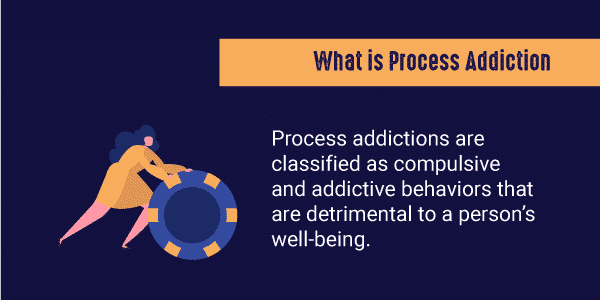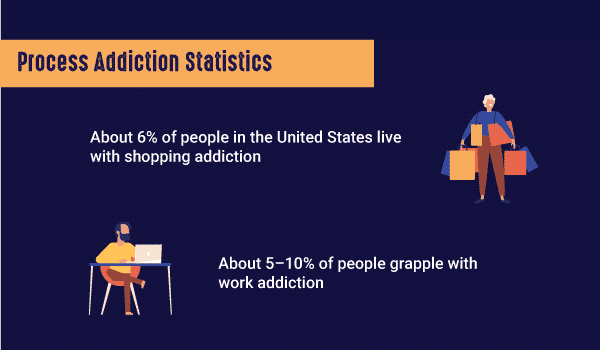
Contrary to popular belief, behaviors can be just as addictive as substances. Referred to as “process addictions,” these mental health conditions can have serious consequences.
Process addiction, also known as behavioral addiction, is an addiction characterized by a strong impulse to partake in a specific behavior. An individual with a process addiction engages in this behavior even when it results in harmful consequences to an individual’s emotional, interpersonal or physical well-being. Process addictions do not involvedrugs or alcohol. Instead, the behaviors themselves provide a natural reward or emotional high. Behavioral addictions are fueled by compulsive behaviors that cause distress across all areas of a person’s life. As with any addictive behaviors, those with process addiction are unable to refrain from taking part in the behavior and require treatment and intervention to stop.
What Is a Process Addiction?
Although most people associate addiction with substances, addictions can occur without the involvement of substances. These addictions are habitual and provide a person with an emotional high, which keeps the person engaging in that behavior. Process addictions are classified as compulsive and addictive behaviors that are detrimental to a person’s well-being. Despite the negative consequences, a person will continue to partake in the behavior and may feel shame and remorse after doing so.
While process addictions don’t involve substances, they share similarcharacteristics with drug or alcohol addiction. Like substance addictions, people with process addictions are unable to control themselves and cannot stop themselves from engaging in certain behaviors. Also similar to substance addictions, a person with a process addiction will remain fixated on a behavior and go to great lengths to avoid the feelings of discomfort that would result from stopping the action. A person with a process addiction will continue to partake in a behavior despite the adverse outcomes that it may cause, which is a hallmark of both types of addictions.

Types of Process Addictions
Some types of process addictions include:
- Gambling addiction
- Sex and love addiction
- Internet addiction
- Exercise addiction
- Shopping addiction
- Work addiction
- Porn addiction
- Food addiction
- Video Game Addiction
The fifth edition of the Diagnostic and Statistical Manual for Mental Disorders (DSM-5) was updated to include process addictions, as prior editions only referenced “substance-related disorders.” Despite the inclusion of this category, the only DSM-5 behavioral addiction currently listed is gambling disorder. While many process addictions still need to be officially classified asmental health disorders, the inclusion ofgambling disorderin the DSM-5 seems to be a step toward accepting process addictions as serious behavioral health conditions.
Signs & Symptoms Process Addiction
Several signs can alert a person as to when afamily member, friend or loved onehas a process addiction.
Some of the most common symptoms of process addiction include:
- Spending an excessive amount of thinking about or partaking in the behavior
- Reduced ability to control a behavior
- Continuing to engage in a behavior despite negative physical or emotional consequences
- Trouble stopping a behavior, including unsuccessful attempts to stop it
- Ignoring occupational, academic and family responsibilities in favor of the behavior
- Using the behavior to cope with difficult emotions and feelings
- Diminishing or downplaying the magnitude of the problem
- Developing a tolerance the behavior, so that the individual needs to increase the frequency or intensity of the behavior to continue to achieve pleasure and fulfillment from it
- Experiencing emotional withdrawal when the behavior is stopped or avoided
- Developing mental health concerns, such as anxiety, irritability, depression or substance addiction, after the behavior stops

Common Behavioral Addictions
There are several common behavioral addictions. These types of process addictions can cause significant distress and impairment in multiple areas of a person’s life.
Some of the most common process addictions include the following:
What Causes Process Addiction?
Genetic, societal and environmental factors can influence the development of process addictions. The behaviors associated with process addictions cause people to experience a high when reward pathways are stimulated in the brain, which reinforces engagement in these behaviors. Other causes of addictive behavior may include past trauma or neglect, feelings of stress or unhappy home life. Outside stressors can also have an impact, as a person may engage in addictive behaviors to alleviate stress and other negative emotions. Additionally, compulsive behaviors may result fromco-occurring mental health conditions, whose symptoms tend to complicate and worsen the process addiction.
Process Addiction Statistics
Behavior addiction statistics reveal that process addictions are more common than most people think:
- Up to10 millionAmericans live with a gambling addiction
- About6 percentof people in the United States live with shopping addiction
- It is estimated that25 percentof Internet search inquiries — or 68 million searches daily — are associated with pornography, and35 percentof downloads are related to pornography
- Exercise addiction impacts about3 percentof people who regularly go to the gym
- About5–10 percentof people grapple with work addiction

Risk Factors for Compulsive Behaviors
Genetics is a significant risk factor for compulsive behaviors, as individuals with family members who have experienced addictions are more likely to develop addictions themselves. Other risk factors include childhood trauma, abuse and neglect, lack of parental oversight or a tumultuous home environment. Individuals who spend a considerable amount of time with a person who has a process addiction can be another risk factor.
Process Addiction and Substance Abuse
Process addiction and substance abuseco-occur frequently and tend to be prompted by the same types of feelings and urges. There are many linkages between substance abuse and specific types of process addictions, includingsex addiction,porn addictionandgambling addiction. Process addiction and substance use disorder are independent conditions, but both are inadequate methods of coping. In some instances, a process addiction and substance abuse can overlap, occur simultaneously and feed off each other when a person switches back and forth between them.
The Professional Counselor Journal reports that individuals with process addictionfrequently have another addictionor disorder accompanying it. It is estimated that sexual and love addiction co-occurs with addiction with rates as high as 40 percent and eating addiction co-occurs around 25 percent. Gambling addiction co-occurs with addiction with rates anywhere between 20 and 30 percent, exercise addiction co-occurs with rates as high as 15 percent and internet addiction co-occurs at about 10 percent.
Treatment for Process Addiction
Treatment for process addictionoften involves professional intervention, as many individuals cannot overcome them on their own. Process addictions can have devastating impacts on a person’s personal, academic, occupational, financial and social life if they are not treated.
Process addiction treatment almost always includes psychotherapy with a behavioral component.Cognitive behavioral therapyis a successful form of behavioral addiction treatment, as it helps a person manage negative thoughts and alter maladaptive patterns of behavior. In therapy, people learn about triggers to their addiction, discuss how and why their addictions occurred and learn healthy coping skills to manage their impulses and urges.
If a process addiction is co-occurring with another disorder,such as a substance abuse disorderor other mental health condition, both disordersmust be treated simultaneously. Each disorder needs to be addressed fully, along with any potential interactions between the two conditions.
At the Recovery Village, you are never alone. Our clinical staff is highly trained in addiction and co-occurring mental health conditions and can assist you in determining which treatment program is right for you.Reach outtoday for more information.
















